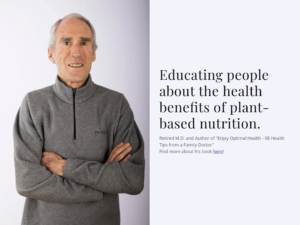Health column by Dr. Greg Feinsinger. Champion of Whole Food Plant Based Living and righteous person.
Depression is a common disorder. Given the difficult times we’re living through right now, most of us could use a mood boost. We know that regular aerobic exercise boosts mood; how about food?
In his book “Your Body in Balance, The New Science of Food, Hormones, and Health,” Dr. Neal Barnard discusses the antidepressant effect of fruits and vegetables. He notes that depression in Japan was uncommon until the 1990s, but since then the incidence has increased dramatically, which appears to be due at least in part to transition from the traditional plant-based Japanese diet to a Western animal-based and processed food diet since 1990. He also cites a study in Spain, that showed that subjects who ate the most plants had the least depression–and there was particular benefit from fruits, nuts, and beans. Another study involving older men and women in Taiwan found that those who ate the most fruits and vegetables had a 62 percent lower risk of depression.
Dr. Barnard himself performed two large studies in cities throughout the U.S., sponsored by the GEICO insurance company. He and his colleagues found that as study participants moved away from animal products and towards a plant-based diet, depression and anxiety improved significantly.
It is thought that at least part of the reason for these findings is that depression has an inflammatory component, and whereas animal products cause inflammation, a plant-based whole food diet is anti-inflammatory. One of the culprits in animal products is arachidonic acid, an inflammatory fat found in chicken, eggs, beef, sausage, and fish. Inflammation/depression can actually destroy brain cells, and recurrent or chronic depression is a risk factor for Alzheimer’s.
Another reason that plant-based nutrition improves mood is that plants have fiber, and fiber is what feeds the health-promoting bacteria in our gut microbiome, including ones that protect against depression. Furthermore, plant foods such as broccoli, spinach, asparagus, and legumes contain the B vitamin folate, which is involved in the synthesis of the “happiness” brain neurotransmitter serotonin. (Note that natural folate in vegetables is not exactly the same thing as folic acid found in vitamin supplements).
Following are some additional food for mood tips from Dr. Barnard and Dr. Michael Greger (nutritionfacts.org):
- Dr. Barnard cites studies showing that consuming two to four servings of soy a day (edamame, tofu, tempeh, miso) improves mood, probably due to micronutrients called isoflavones.
- Dr. Barnard notes that mood improves when the first thing you eat in the morning is plant protein—before you eat carbohydrates such as cereal. He points out that several cultures have adopted this habit: beans on toast in England, black beans in Mexico, hummus in the Middle East. He suggests starting your breakfast with scrambled tofu, soymilk, or a small serving of beans or chickpeas.
- We know that plant foods with intense flavor (herbs and spices) and/or color have special health properties. Dr. Greger cites studies showing that a pinch of rosemary improves mood. This spice can be found at any grocery store and can be bought in bulk at Natural Grocers in Glenwood.
- Dr. Greger also had a recent blog on nutritionfacts.org on which he presented evidence that saffron is as effective in treating depression as pharmaceutical antidepressants—and without side effects. Saffron has also been shown to be effective in treating antidepressant-caused sexual dysfunction. The active ingredient in saffron is crocin, a yellow carotenoid pigment. Saffron is expensive when used as a spice, but capsules can be found for sale on the internet at a reasonable price. Supplements are poorly controlled, but the saffron extract with brand name Golden Saffron appears to be safe and effective.

Leave a Reply